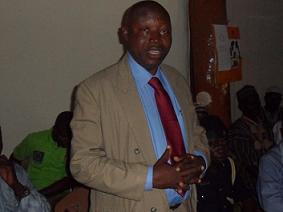
Mr Bede Ziedeng, Northern Regional Minister has expressed disappointment at the lukewarm attitude and poor attendance of the Savannah Accelerated Development Authority (SADA) Stakeholder Coordinating Meetings, noting that, this affects the smooth running of the organization.
The poor attendance at the second SADA Stakeholder Coordinating Committee Meeting compelled the Minister to conduct a head-count of all stakeholders from the Northern, Upper East, Upper West, Volta and Brong Ahafo regions after which he indicated that the meeting was not properly constituted.
He said the committee had also failed to meet at least twice in a year, therefore making it quite difficult to offer positive decisions for SADA to effectively operate and discharge its duties saying: “We are supposed to offer useful suggestions to SADA and give constructive criticisms for the organization to function.”
Mr Ziedeng expressed the disappointment in Tamale on Tuesday during the second SADA Stakeholder Coordinating Meeting. Out of the expected 55 to 60 stakeholders who were supposed to attend the meeting to deliberate on the previous minutes and the Chief Executive Officer’s (CEO) annual report, only a little over 20 members were in attendance.
The Minister, who is also Chairman of the Committee, expressed disappointment at the bad media reportage the authority received over the past year, stressing that such reports had dented the reputation, credibility and image of the organization.
According to him, SADA had equally failed to reposition itself over the brouhaha on the guinea fowl and afforestation projects, making the international community and development partners to cast a doubt over SADA saying, “It makes it difficult to convince them about funding for SADA.”
Mr Ziedeng therefore urged authorities of the organization to work on its image to regain its credibility and reliability. Dr Charles Jebuni, Acting CEO of SADA apologized for the inability to organize meetings as expected and explained that the guinea fowl project was a joint venture but was misconstrued as if SADA were producing guinea fowl.
He said the joint company would soon sell 5,000 guinea fowls in Accra and Kumasi for people to know what was going on and indicated that 10,000 farming families had gained jobs through the guinea fowl project.
On modernization of agriculture, he said 20,000 households had access to subsidized fertilizer, seed, and agronomic training support leading to the cultivation of over 19,000 acres of farm lands, stressing that 2,000 farm families were also supported to grow mango to increase their assets base.
Dr Jebuni said SADA engaged a private company to create 5,000 employment opportunities for the youth to plant 5,000,000 trees, adding that the University for Development Studies had been contracted to audit the project.
He said SADA would introduce a number of innovations in 2014 including apiculture and new technology for shea nut picking and an affordable housing project to enhance the standards of living of people.